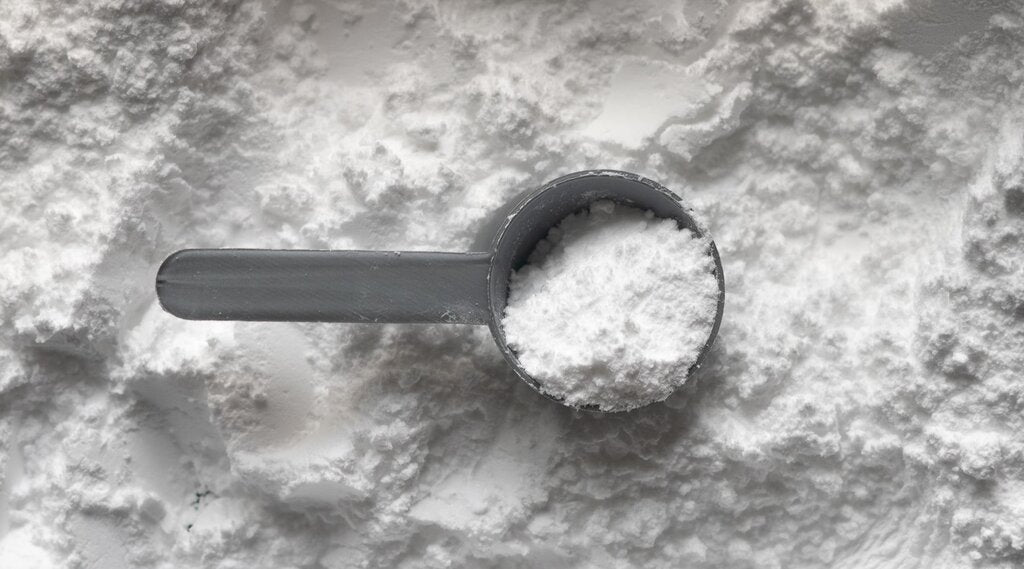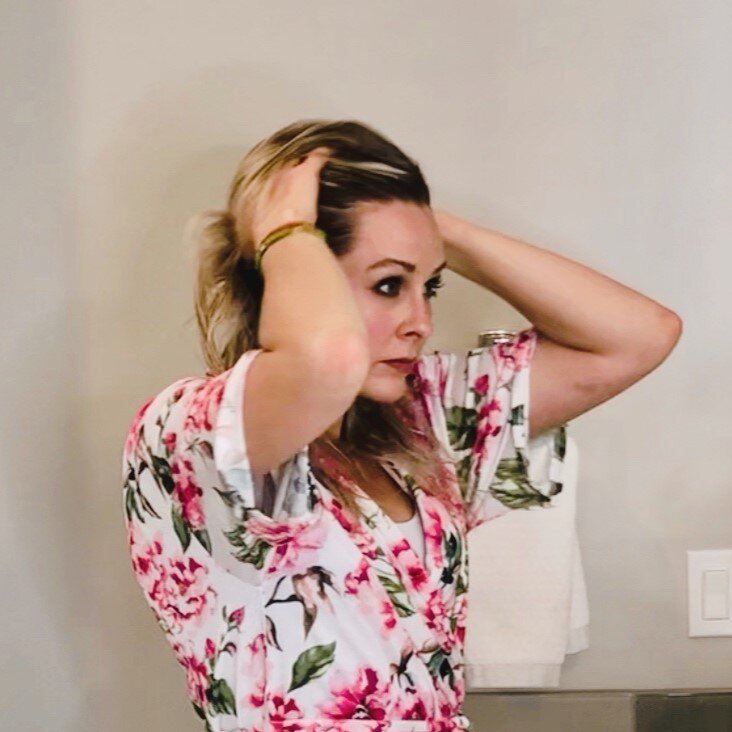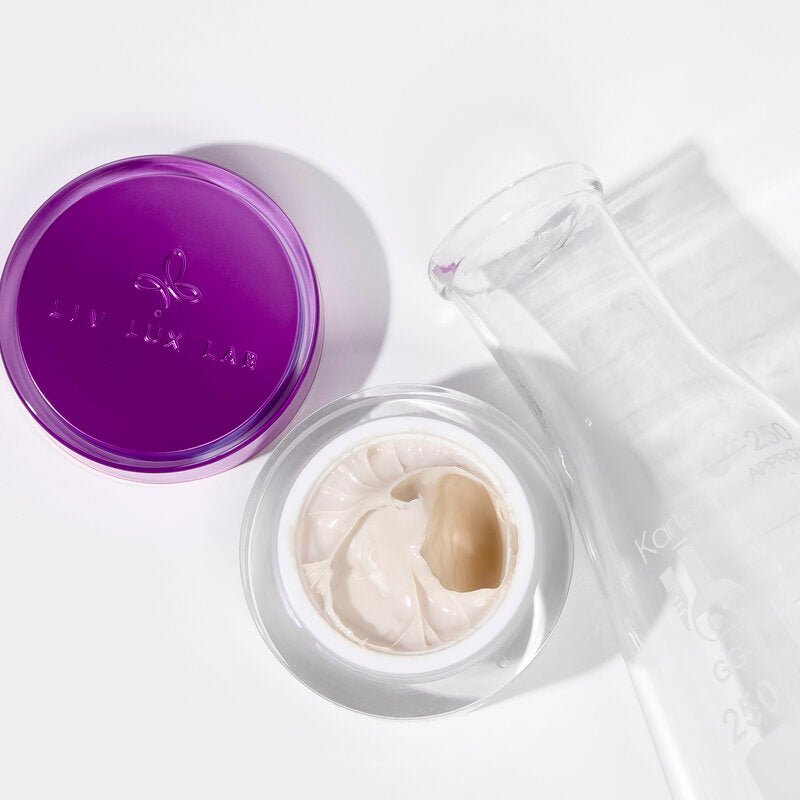Unlock the Power of Creatine for Hair Growth
You may know creatine as an essential supplement for athletes, but did you know it’s also a game-changer for hair repair and scalp health? At Save Me From, we’ve harnessed the science-backed benefits of creatine for hair to strengthen follicles, reduce breakage, and restore hydration—leaving you with thicker, healthier hair.
Ready to revitalize your hair with the power of creatine? Let’s dive into what creatine is, how it works, and why it belongs in your hair care routine.
What is creatine?
Creatine is a naturally occurring compound derived from glycine, arginine, and methionine—three amino acids that fuel cellular energy production. Creatine, also known as kreatin in some languages, is found naturally in the brain and muscles of the human body and most types of meat and fish. Creatine can enhance sports performance; help build muscle and help with energy during high-intensity exercise. Creatine may also be beneficial for brain function and cognitive performance. Since creatine serves as a precursor to adenosine triphosphate (ATP), the energy carrying molecule found in the cells of all living things, it is also known to possess topical beauty benefits for skin and hair too! While it’s widely used in sports nutrition, research shows creatine also plays a crucial role in hair strength, hydration, and growth.
How Creatine Works in Hair Care
🔹 Strengthens hair fibers to prevent breakage
🔹 Restores hydration for smoother, healthier hair
🔹 Boosts scalp barrier function to protect follicles
🔹 Enhances protein synthesis to improve elasticity
Scientific studies have found that topically applied creatine penetrates the scalp, delivering energy to hair follicles and helping to increase density, thickness, and moisture retention.
Why is ATP important?
Creatine and phosphocreatine, when a phosphate group attaches to creatine, is naturally stored in our muscles within a limited reservoir waiting to be utilized during high-intensity and resistance-based tasks. When our muscles do work, they use ATP. It involves removing a phosphate group from adenotriphosphate (ATP with three phosphates) which becomes adenodiphosphate (ADP with two phosphates). Phosphocreatine donates its phosphate group so ADP can quickly become ATP again and we can do more work. High-intensity exercise uses a large amount of ATP and needs to access ATP rapidly. When ATP isn’t available quickly, performance can decline. Phosphocreatine provides rapid ATP replenishment.
Where does creatine come from?
Many bodybuilders and exercise gurus take creatine supplements to help improve their exercise performance and increase muscle mass. What is creatine made from? Most humans get their supply of creatine from eating meat or taking supplements. Supplements and cosmetic ingredients of this amino-acid compound may be animal-derived or synthetic. Save Me From hair care products contain synthetically derived creatine for topical beauty benefits.
Is creatine only effective for men?
No. Although we constantly hear about the benefits of creatine for men, creatine is not only a supplement for men, but beneficial for women as well. Creatine is an effective supplement for both men and women for physical performance. In addition, there are creatine benefits for mental health and topical beauty benefits too. There is accumulating evidence that creatine supplementation has the potential of being a multitherapeutic intervention across the lifespan of women. Creatine is also beneficial for older adults, too. Sarcopenia, defined as a progressive and generalized skeletal muscle condition where muscle mass declines that can lead to increased falls, fractures and mortality, can be mitigated when creatine supplementation is combined with resistance training. Creatine, combined with a whole-body resistance program, may also improve bone mass. However, creatine alone without an adjoining resistance training plan, is unlikely to result in enhanced muscle strength, bone mass or in preventing sarcopenia. So if you’re looking for the amazing creatine benefits for men or women
Is creatine safe?
The overwhelming majority of evidence in adult populations indicates that creatine supplementation, both short-and longer-term, is safe and generally well tolerated. Based on limited evidence, creatine supplementation appears safe and potentially beneficial for children and adolescents. As a naturally occurring amino acid, it is considered safe.
Is creatine an anabolic steroid?
While the physiological and performance outcomes of anabolic steroids and creatine may be similar, the mechanisms of action and structure are not. Anabolic steroids are synthetic versions of testosterone, the androgenic hormone produced naturally in both men and females helpful for building muscle mass and strength. Testosterone can enter the muscle cell, bind with androgen receptors, and increase muscle-specific genes for increased muscle strength. Creatine is works differently by converting creatine into phosphocreatine, which then helps create adenosine triphosphate. Creatine can increase the capacity of ATP. This helps to improve the energy produced during heavy anaerobic exercise, and thus increases muscle power and repetitions for increased muscular strength.
Does creatine cause water retention?
Creatine is an osmotically active substance and due to this nature, creatine could theoretically result in increased water retention. When creatine is utilized in the muscle, it requires a sodium-dependent transporter, thus water will be taken up into the muscle to help maintain intracellular osmolality. However, a number of training studies conducted over a period of 5 to 10 weeks, have shown no increases in total body water. While there is some evidence that suggests that creatine supplementation increases water retention over the short term, there are several studies suggesting it does not alter total body water over the long term.
Does creatine cause hairloss?
There’s been speculation that creatine might cause hair loss, but current research does not support this claim. While a 2009 rugby player study suggested creatine could increase DHT (dihydrotestosterone), which is linked to hair loss, later studies failed to replicate these findings.
After a single study was conducted on a team of rugby players in 2009 that showed those supplemented with creatine experienced an increase in serum dihydrotestosterone (DHT) overtime, speculation regarding creatine and hair loss gained momentum. This question of “does creatine cause baldness” is because when there are high level of androgens present, specifically DHT, it has been shown to bind to susceptible hair follicles, cause shrinkage, a shortened hair growth phase and for hair loss to occur. It is important to note that the results seen in the van der Merwe study have not been replicated in other creatine hair loss studies and that intense resistance exercise itself can cause increases in these androgenic hormones. In the van der Merwe study, there was no increase in total testosterone, free testosterone was not measured and the started DHT level of the control group was 23% lower in DHT at baseline to begin with. In summary, current evidence does not suggest that creatine supplementation causes hair loss, nor does it increase total testosterone, free testosterone, or DHT.
Creatine does not cause hair loss. In contrast, research shows that creatine may benefit hair follicles, strengthening strands and reducing damage when used in hair products like Save Me From’s Creatine Hair Treatment.
Is creatine good for skin and hair?
Now that we know the answer to the question, “Does creatine cause hair loss?” (no, no, it does not), we can discuss some other exciting benefits of creatine for skin and the benefits of creatine for hair. Although creatine has been mostly studies as a performance aid for exercise, training and for delaying age-related decline, several other health and beauty benefits have been reported. Since creatine plays a critical role in cellular metabolism, creatine has been shown helpful in lessening the severity of injury and disease conditions particularly when oxygen is compromised, but creatine effect on hair and creatine effect on skin can improve their energy.
What are the topical benefits of creatine?
Studies have reported that the topical skin care benefits with creatine include improving the revitalization of cellular energy metabolism, reducing the cellular stress caused by both oxidative and UV damage, supporting skin protection, helping skin moisturization and helping to reduce premature skin aging. Creatine studies have also shown creatine helps boost skin firmness and skin rejuvenation.
The “cell energizing” effect of creatine was assessed in-vitro in cell cultures. Keratinocytes were incubated with creatine for 24 hours with results showing 60% higher cell vitality when treated with creatine. This increase in cell vitality causes an increase in cellular protein, such as collagen. Creatine was also shown to stimulate both mitochondrial activity and protein synthesis in the skin.
Can creatine penetrate the skin?
Yes, the topical application of creatine for skin has been proven to rapidly penetrate the skin to the dermis, where it was then found to be helpful in helping to stimulate collagen for lessened appearance of wrinkles. When a topical formula containing creatine was applied for six weeks consistently, participants saw a significant reduction in sagging cheeks in the jowl areas, reduced crow’s feet, and lessened wrinkles under the eyes. Researcher concluded that creatine was a beneficial active ingredient for skin health, helping with the prevention and treatment of skin aging.
What are creatine hair benefits?
Why are you beginning to hear about creatine in hair care? What is creatine for hair doing? What does creatine do to your hair? All great questions. Creatine hair care is rising in popularity because creatine works. There are both creatine benefits for hair and creatine benefits for scalp. Creatine for hair is hair conditioning and offers a hair bond building effect. Creatine benefits for the hair offers a conditioning effect that improves the hair body and hair volume. Creatine and hair help to improve the dry feel of hair when used before bleaching and permanent waving the hair. In a study applying creatine on hair, creatine was able to help smooth the surface of the hair when used 5 times, allowing creatine to soak into hair for 5 minutes and then either rinsed or left in the hair. This helped to improve the strength of hair when combed, bleached, and permed.
How does creatine help restore hair bonds?
There are three bonds responsible for improving the strength of hair. They are:
- Covalent bonds which form an S-S bond (disulfide bond) of cysteine. This is the strongest chemical bond in hair.
- Electrostatic bonds (also known as ionic bonds) where two oppositely charged ions bond. These are the second strongest bonds in hair that can break when hair is wet.
- Hydrogen bonds which are not very strong but numerous.
Creatine has been shown to help build the electrostatic bonds between amino groups and anionic side chains of the amino acids of hair (cysteine, cysteic acid and glutamic acid). With this increased number of electrostatic bonds, hair strength is improved. I have also found my hair to be stronger when bleached and even when wet with regular creatine hair bond builders. Hair strength was shown to improve by 28% and elasticity was shown to increase by 38% after five uses with creatine application on hair.
Read more on how hair bond builders work, here.

How Creatine Boosts Hair Growth & Scalp Health
The benefits of creatine for hair go beyond repair—studies suggest it helps with cellular energy metabolism, enhancing follicle vitality and stimulating protein synthesis, which supports:
✔ Thicker, fuller hair with increased density
✔ Reduced hair breakage for stronger strands
✔ Improved hydration for smoother, shinier hair
✔ Healthy scalp function to optimize hair growth
Clinical findings indicate that creatine can improve skin and hair rejuvenation, making it a powerful ingredient in anti-aging hair care.
In a 4-month creatine hair growth study, findings suggest that the use of a creatine for hair growth lotion in a supportive topical hair care regimen accelerated the recovery in women with acute telogen effluvium, with signs of the disorder resolving being observed after only 1 month of use instead of 3–4 months in our controls. Reducing shedding and accelerating the recovery time is essential for relieving and minimizing the psychological burden associated with hair loss.
The creatine for hair growth hair lotion tested in the study contained creatine which was known to display hair growth-stimulating features. Creatine was shown to stimulate DNA synthesis and to increase noggin protein levels in dermal papilla cells. The noggin protein is an important factor for telogen–anagen transition of the hair follicle. Creatine may therefore have had a hair growth-inducing effect on our subjects with telogen effluvium, both by increasing dermal papilla cell activity and by stimulating the anagen phase of the hair follicle. Creatine could also promote perifollicular angiogenesis by increasing the synthesis of the vascular endothelial growth factor (VEGF) in dermal papilla cells. The combined action of these agents may well have stimulated scalp microvascularization in subjects who used the test product in our study, enhancing the blood supply to the hair follicle and providing the cells with the nutrients and oxygen. The VEGF is also important for anagen maintenance and may contribute to accelerated hair regrowth and to enlargement of the hair follicles and shafts.
So, does creatine help hair growth? Overall, the study indicates that creatine helps hair growth. Topical creatine helped with hair growth when using a hair care product containing creatine. The hair growth product with creatine acted on the hair growth cycle and a key angiogenic factor that could help to reduce hair loss in women with acute telogen effluvium and speed up physiological recovery. The creatine hair care lotion reduced hair shedding earlier and led to a faster reduction in telogen hair density compared to the use of a neutral shampoo alone. This randomized clinical trial answers the question, “does creatine help with hair growth?” Research supports the use of creatine products as a supportive hair care regime for women with telogen effluvium, as any notable reduction in shedding and shortening of the recovery time will be valuable for helping to alleviate the psychological and emotional burden of this condition on affected subjects.
Should I look for creatine in shampoo?
A creatine shampoo may sound helpful, but should you shampoo creatine out of your hair? Creatine is more effective for hair when used for at least five minutes (when hoping to restore hair bonds) and for hair growth as a hair treatment that is left in. It is best to find creatine hair products in a lotion or leave-in treatment form. Save Me From hair care products with creatine are formulated to be used in this way. Each creatine topical containing hair product is designed to be lightweight and is best when applied sparingly to clean, damp hair and massage on the scalp. Then allowed to remain in the hair for bond building, conditioning and volumizing results.
Is creatine good for hair?
To summarize our article, yes, creatine is not only very good for the body, the skin but creatine is good for the hair and scalp. It’s a good idea to look for creatine in hair products like Save Me From hair care.

Conclusion: 6 Answers to what is creatine good for?
- Creatine can improve cellular energy availability and support general health, fitness and well-being throughout life.
- Create is good for physical fitness and can improve muscle gains in and help maintain or increase muscle mass in older people.
- Creatine is good for the mind and can help support cognitive function and mental health.
- Creatine is good for skin and can improve skin health, helping to delay the look of wrinkles.
- Creatine is good for hair and can improve hair health.
- Creatine is good for hair growth and can improve scalp health.
Why Save Me From Uses Creatine in Our Hair Repair Treatment?
At Save Me From, our Fenugen-powered formula combines bio-optimized creatine and Bond Reboot technology to deliver clinically proven hair repair benefits. Our topical creatine complex supports stronger follicles, increased hydration, and scalp protection, restoring hair from root to tip.
👩🔬 Backed by science—Formulated for maximum effectiveness
🌿 Hydration + strength—Reduces breakage, improves elasticity
💡 Advanced technology—Targets scalp health for better hair growt
***
Biochemical and Biophysical Research Communications, January 2002, pages 47–52
Botchkarev VA, Botchkareva NV, Sharov AA, Funa K, Huber O, Gilchrest BA. Modulation of BMP signaling by noggin is required for induction of the secondary (nontylotrich) hair follicles. J Invest Dermatol 2002; 118: 3–10.
Dolan E, Artioli GG, Pereira RMR, Gualano B. Muscular Atrophy and Sarcopenia in the Elderly: Is There a Role for Creatine Supplementation? Biomolecules. 2019; 9(11):642. https://doi.org/10.3390/biom9110642
Hamilton, K. L., Meyers, M. C., Skelly, W. A., & Marley, R. J. (2000). Oral creatine supplementation and upper extremity anaerobic response in females. INTERNATIONAL JOURNAL OF SPORT NUTRITION, 10(3), 277-289.
Hayashi AP, Solis MY, Sapienza MT, et al. Efficacy and safety of creatine supplementation in childhood-onset systemic lupus erythematosus: a randomized, double-blind, placebo-controlled, crossover trial. Lupus. 2014;23(14):1500-1511. doi:10.1177/0961203314546017
Journal of Cosmetic Dermatology, March 2011 and December 2011, pages 15-23 and 273-281
Journal of Investigative Dermatology, February 2005, pages 443-452
Journal of the American Academy of Dermatology, March 2005, page 225
Kaviani, M., Shaw, K., & Chilibeck, P. D. (2020). Benefits of creatine supplementation for vegetarians compared to omnivorous athletes: a systematic review. International journal of environmental research and public health, 17(9), 3041.
Kreider RB, Stout JR. Creatine in Health and Disease. Nutrients. 2021; 13(2):447.
Lenz, H.; Schmidt, M.; Welge, V.; Schlattner, U.; Wallimann, T.; Elsasser, H.P.; Wittern, K.P.; Wenck, H.; Stab, F.; Blatt, T. The creatine kinase system in human skin: Protective effects of creatine against oxidative and UV damage in vitro and in vivo. J. Investig. Dermatol. 2005, 124, 443–452.
Mammone T, Gan DC, Hawkins G, Presti R, Sparacio RM. Method for increasing hair growth. European Patent Office Publ. of Application without search report EP20040714661. 25 Feb 2004.
Peirano, R.I.; Achterberg, V.; Dusing, H.J.; Akhiani, M.; Koop, U.; Jaspers, S.; Kruger, A.; Schwengler, H.; Hamann, T.; Wenck, H.; et al. Dermal penetration of creatine from a face-care formulation containing creatine, guarana and glycerol is linked to effective antiwrinkle and antisagging efficacy in male subjects. J. Cosmet. Dermatol. 2011, 10, 273–281.
Plikus MV, Mayer JA, de la Cruz D et al. Cyclic dermal BMP signalling regulates stem cell activation during hair regeneration. Nature 2008; 451: 340–344.
Powers ME, Arnold BL, Weltman AL, Perrin DH, Mistry D, Kahler DM, Kraemer W, Volek J. Creatine Supplementation Increases Total Body Water Without Altering Fluid Distribution. J Athl Train. 2003 Mar;38(1):44-50. PMID: 12937471; PMCID: PMC155510.
Turlier, V., Darde, M.-.-S., Loustau, J. and Mengeaud, V. (2021), Assessment of the effects of a hair lotion in women with acute telogen effluvium: a randomized controlled study. J Eur Acad Dermatol Venereol, 35: 12-20. https://doi.org/10.1111/jdv.17245
van der Merwe, Johann MBChB; Brooks, Naomi E PhD; Myburgh, Kathryn H PhD. Three Weeks of Creatine Monohydrate Supplementation Affects Dihydrotestosterone to Testosterone Ratio in College-Aged Rugby Players. Clinical Journal of Sport Medicine: September 2009 - Volume 19 - Issue 5 - p 399-404 doi: 10.1097/JSM.0b013e3181b8b52f
Vandenberghe, K., Goris, M., Van Hecke, P., Van Leemputte, M., Vangerven, L., & Hespel, P. (1997). Long-term creatine intake is beneficial to muscle performance during resistance training. Journal of applied physiology, 83(6), 2055-2063.





